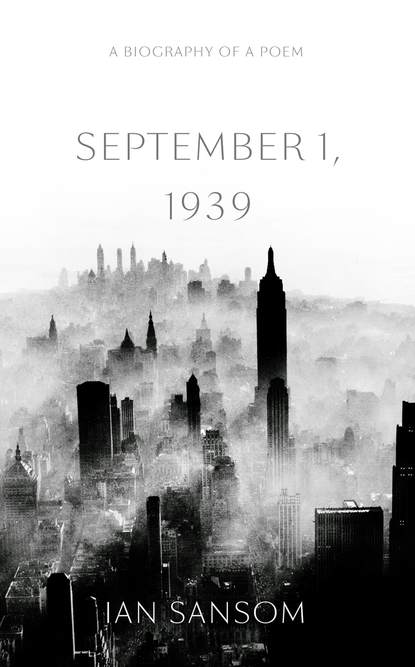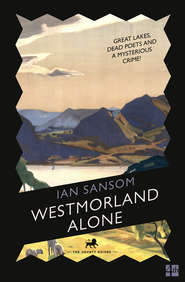По всем вопросам обращайтесь на: info@litportal.ru
(©) 2003-2024.
✖
September 1, 1939: A Biography of a Poem
Настройки чтения
Размер шрифта
Высота строк
Поля
*
1 September 1939 inaugurated an entirely new kind of war. World War I had been fought by infantrymen moving slowly, heroically and predictably into battlefields prepared for war: ‘They fell with their faces to the foe’, in the words of Laurence Binyon’s famous poem ‘For the Fallen’. But on 1 September, Hitler unleashed ‘blitzkrieg’ – lightning war, impersonal war, war that was intended to lead to Vernichtungsschlacht, annihilation. First came the air attacks and bombing raids, then the motorised infantry and the tanks, followed by the SS Death’s Head regiments who conducted what were euphemistically referred to as ‘police and security’ measures to ensure what Himmler called the ‘radical suppression of the incipient Polish insurrection in the newly occupied parts of Upper Silesia’. Within a week, Cracow, with a population of a quarter of a million, was under German control. Twenty-four thousand SS troops had moved into Poland, by train, by plane and on foot; the massacres of civilians began. Villages and towns were set alight. There were public executions.
*
The front-page headline of the New York Times on Friday, 1 September 1939 tapped it all out in telegraphese: ‘GERMAN ARMY ATTACKS POLAND; CITIES BOMBED, PORT BLOCKADED; DANZIG IS ACCEPTED INTO REICH’. With their trochaic-patterned strong-stressed syllables, one might almost rearrange the lines into verse:
German army attacks Poland;
Cities bombed, port blockaded;
Danzig is accepted into Reich.
The lead column then begins with the words ‘BRITISH MOBILIZING’.
Indeed they were – and had been for some time.
*
In England, ever since the Munich Agreement of September 1938, trenches had been dug, air-raid shelters constructed and barrage balloons floated above London. The pictures from the National Gallery had been packed up and sent off to Wales. Most of the British Museum’s treasures were safely stored in an underground tunnel in Aberystwyth. Rationing was being planned.
*
And meanwhile, back in America … what exactly was Auden up to?
We know roughly what he was up to.
*
On 12 June 2013, the British Library acquired an Auden manuscript at Christie’s in London for £47,475. It was Auden’s diary for August and November 1939, written in a ‘National’ notebook, made in the USA, ‘this book contains eye-ease paper, “Easy on the Eyes”.’ The diary is incorrectly dated, by Auden, ‘August 1938’. The entry for 1 September begins ‘Woke with a headache after a night of bad dreams in which C [Chester Kallman] was unfaithful. Paper reports German attack on Poland.’ There follow several pages of notes on scientific and political subjects – beginning with ‘Good News,’ [underlined]. ‘A scanning microscope has been invented.’
(‘A scanning microscope’ is another way of describing a poem.)
*
At 9.30 p.m. on 1 September, the British government issued an ultimatum to the Nazis to withdraw from Poland.
At 9 a.m. on 3 September, a second ultimatum was issued to the German Foreign Office in Berlin: Sir Nevile Henderson, the British Ambassador, read out the ultimatum to a deserted room.
And then finally, at 11.15 a.m. on 3 September, the British prime minister, Neville Chamberlain, broadcast to the nation on the BBC. The country, he announced, was at war:
This morning the British Ambassador in Berlin handed the German Government a final note stating that, unless we heard from them by eleven o’clock that they were prepared at once to withdraw their troops from Poland, a state of war would exist between us. I have to tell you now that no such undertaking has been received, and that consequently this country is at war with Germany.
Also on 3 September, the American president, Franklin Roosevelt, made his own radio broadcast, of a very different kind: ‘Let no man or woman thoughtlessly or falsely talk of America sending its armies to European fields. At this moment there is being prepared a proclamation of American neutrality.’ There would be, Roosevelt promised, ‘no blackout of peace in the United States’.
(The proclamation, the American neutrality, the promise of no blackout of peace: Roosevelt’s words seem to echo in the words of Auden’s poem, which indeed contains a ‘proclaim’, a ‘neutral’ and the famous ironic points of light. How many poems, one wonders, are plucked from the ether, and how many from the airwaves? Poets are like thieves and spies; they’re always listening in. It’s like that film The Lives of Others, the one about the spy in East Germany, eavesdropping with his headphones on. Poems are the words of others – the words of us all. There’s a poem by Denise Riley, ‘Lure, 1963’, for example, which is composed of snatches of half-remembered pop lyrics – ‘The Great Pretender’ by The Platters, ‘The Wanderer’ by Dion, ‘It’s in His Kiss’ by Betty Everett. One of the truly great works of literary criticism, John Livingston Lowes’s The Road to Xanadu: A Study in the Ways of the Imagination, a study of the work of Coleridge, basically consists of Lowes eavesdropping on Coleridge’s eavesdroppings, tracing every image to its source in Coleridge’s reading. As a model, Lowes is probably best avoided: the book is pretty much unreadable; The Road to Xanadu contains too many detours.)
*
(‘Does your book have an argument?’ asks my editor. ‘It’s more a series of detours,’ I say. ‘And cul-de-sacs. And dead ends. And stoppings-short.’ ‘Like a journey?’ ‘Sort of like a journey.’ This is not a journey. And I am no John Livingston Lowes. This is either the beginning of the preparations for a journey, or the aftermath.)
*
In London, in the days leading up to 1 September, according to The Times, things were ‘largely normal’:
London at this time of tension has retained its usual appearance to a remarkable extent, but there are differences which the continuing crisis has made unavoidable. In the streets one of the most obvious is the banking of sandbags which now shields many buildings. Londoners are carrying on much the same as usual, except that every one is contributing something towards ensuring complete preparedness for any emergency. No worried casualties in a war of nerves are to be seen; the population remain calm, hopeful, and resolute.
(‘London Largely Normal: Calm in Time of Tension, Defence Activities’, The Times, Thursday, 31 August 1939)
Calm, hopeful, resolute? Maybe it was. I don’t know.
My family were all Londoners. I wish I could have asked them what it was like, but they had things to do. They were busy.
*
On 1 September 1939, my father was busy being evacuated:
The Government decision that evacuation should begin to-day as a precaution was made known yesterday in the following announcement by the Minister of Health, Mr. Elliot, and the Secretary of State for Scotland, Mr. Colville, which was broadcast several times during the day: — It has been decided to start evacuation of the school children and other priority classes as already arranged under the Government scheme to-morrow (Friday, September 1) […] Mothers and other persons in charge of children below school age should take hand luggage with the same equipment for themselves and their children as for school children. The names of the children should be written on strong paper and sewn on to their clothes. No one can take more than a little hand luggage.
(‘Evacuation To-Day: Official Advice to Parents, “A Great National Undertaking”’, The Times, Friday, 1 September 1939)
And my grandfather – who knows? He may well have been busy with the rest of the East End, all those cheerful Cockney geezers preparing for war:
East London is prepared, and the people living in this lively, crowded, industrially important part of the capital are justifiably proud of what they have done towards completing the nation’s defences. A tour of East London yesterday was a stirring and heartening experience. At one point, not far from the docks, a piece of waste land had fallen into the hands of a big squad of willing and tireless workers, whose picks and spades were quickly supplying fillings for thousands of sandbags. Stripped to the waist, the men dug vigorously, pausing only now and then to make a fellow-worker laugh with a cheerful quip.
(‘Cheerfulness in East London: Voluntary Help, Willing and Tireless Workers’, The Times, Friday, 1 September 1939)
The whole scene sounds highly unlikely, frankly – a fantasy of the Times reporter – but on the other hand I can certainly imagine him, my grandfather, George Sansom, stripped to the waist, filling sandbags, ready with a cheerful quip. He was a boxer, a tough guy, a sweet man, and born the same year as Auden, coincidentally, 1907, though his life and Auden’s could not have been more different. When Auden was moving from prep school to boarding school, George Sansom was leaving school to go and work at Windsor and Newton paint manufacturers in east London. When Auden was going up to Oxford, George Sansom was going off to work in a factory making orange boxes. And while Auden sat out the war, safe in New York, he served in the Merchant Navy. The year Auden died, George Sansom was retiring from the Post Office, where he’d worked as a postman for most of his adult life. Auden died in Austria, where he’d bought a home on the proceeds of book sales and awards. My grandfather died in Essex, having moved from his council flat in Poplar into sheltered accommodation on a busy main road in Romford. At Auden’s funeral, they played Siegfried’s Funeral March from Tristan und Isolde. After my granddad’s funeral at the crematorium, when all the family got together to clear out the flat, I was not surprised to find that there were no books in the house, not a single one, and that he owned only the clothes he stood up in, some bed linen, a few pots and pans, and three LPs: the Massed Bands of the Royal Marines; an Elvis Christmas album; and The Best of Pavarotti. His life savings were exactly one hundred and one pounds. When Auden speaks on others’ behalf in this poem, as he so often liked to do – ‘I and the public’, ‘We must suffer them all again’, ‘our wish’, ‘We must love one another or die’ – I wonder if he thought he was speaking on behalf of people like my grandfather. If he did, my grandfather certainly would not have thanked him for it.
*
(I make no apology for bringing in these family matters here, though I’ll try not to make a habit of it. Auden’s reviews and essays are defiantly personal, of course – but that’s always been a perk of the privileged; they’re allowed to be defiantly personal, because of who they are. They’ve earned it. The rich and the famous, we assume, and they assume, are just more interesting than the rest of us. They have permission to do and say what they want. Auden begins an early review, for example, ‘If the business of a reviewer is to describe the contents of the books he reviews and to appraise their value, this is not going to be a review.’ Well, in that case: this is not going to be a book.)
Anyway, all of this is just to be clear at the outset that a lot was happening on 1 September 1939.
And a lot is happening in ‘September 1, 1939’.
1 (#litres_trial_promo)
I sit in one of the dives
On Fifty-Second Street
Uncertain and afraid
As the clever hopes expire
Of a low dishonest decade:











